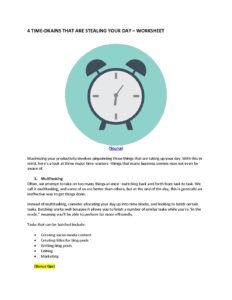You know how it goes. You start out in the morning, ready to go –with all of the tasks that you need to get done weighing heavy on your mind.
When you get to work, you’re able to finish a few of the things on your list –but then something happens –you get distracted. Maybe it was a customer asking you a question or the phone ringing non-stop. Before you know it, it’s already late afternoon and your to-do list still has 20 things on it –and you’re left wondering where the day went, and why you can’t seem to find time to get anything done.
If this sounds like you, you’re not alone. The fact is that most of us have time-drains in our life –things that eat into our day and keep us from accomplishing things that we set out to do. While most of the time these things are obvious –maybe social media, or browsing headlines, sometimes it’s the subtle things that are the worst culprits for taking up our time.
Maximizing your productivity involves pinpointing those things that are taking up your day. With this in mind, here’s a look at four major time-wasters now –things that many business owners may not even be aware of.
Multitasking
Often, we attempt to take on too many things at once –switching back and forth from task to task. We call it multitasking, and some of us are better than others, but at the end of the day, this is generally an ineffective way to get things done.
This is because the time that it takes to switch back and forth could be better spent zeroing in on the task at hand, allowing you to devote your full attention to it and finishing it in a reasonable timeframe –instead of having to constantly change gears and attempt to refocus after your attention’s shifted.
Instead of multitasking, consider allocating your day up into time blocks, and looking to batch certain tasks. Batching works well because it allows you to finish a number of similar tasks while you’re “in the mode,” meaning you’ll be able to perform far more efficiently. Examples of tasks that can be batched include: creating social media content, creating titles for blog posts, writing blog posts, editing, and marketing.
We use email a lot. And it can be more efficient than other means of communication, but that largely depends on how you’re using it.
Being available continually via email around the clock can take a significant toll on our productivity. Hitting refresh mindlessly is a constant distraction, and fielding and responding to new messages is too.
Of course, this one does depend on what industry you’re in –as for some of us, being connected for a certain block of time can be helpful, or indeed may even be a job requirement! But for those of us for whom email isn’t an integral part of our day-to-day tasks, it’s good to try to reduce the amount of time that we spend on it.

Get our 4 Time-Drains That Are Stealing Your Day - Worksheet delivered right to your inbox.
One idea is to look to dedicate specific time-slots to checking and responding to emails. Or, consider automating your emails as much as you can –email marketing, for example, allows you to send out targeted emails to different customer segments.
Or, consider outsourcing your email management to a virtual assistant, to save yourself from all of the time and effort. Your VA will be able to field emails, answer inquiries, do follow-ups, schedule interviews and arrange appointments, as well as add tasks to your calendar –all things that, depending on your workload, can represent a considerable time-savings.
Interruptions
We’ve all been there. You’re deep in a project, struggling to wrap it up, when suddenly your phone vibrates. You know you shouldn’t but you can’t resist stealing a quick glance. It’s your data provider informing you that your minutes are running low –or some equally mundane announcement.
Once again, a proactive approach is in order. Instead of letting small interruptions eat into your day, try to block out time in your schedule to get things done. Switch your phone off, sign out of your email, or hang a do-not-disturb sign on your door. Or put some headphones on –to block out distractions, and indicate to others that you’re busy; whatever it takes to get you some quiet and uninterrupted time to finish your work.
It takes an estimated 23 minutes to recover from an interruption at work –and no doubt much longer if you have a particularly chatty visitor –so reducing interruptions is something that should be high on the priority list.
If you find that your employees are suffering from constant interruptions, one way to reduce them is by implementing office hours for your team –specific times of day, or days of the week, that are dedicated
to employee communications. This will save your team from constantly being interrupted by one question after the other, and instead consolidates the questions into groups, allowing your team to address them all at once.
Vague Objectives
Finally, but arguably most importantly –one of the biggest time-wasters is having unclear objectives.
It may seem unlikely, but vague goals are by far the biggest time-waster as, without a clear plan, you won’t have any idea where you should be spending your time and energy. Setting big-picture goals is fine –as long as they’re clear –and able to be broken down into smaller steps –and given deadlines.
So simply saying “grow the business” isn’t specific enough. What does growth look like or even mean? Do you mean that you’d like to expand your customer base? Increase profits? Boost sales? Are you talking about long-term growth or an immediate spike in sales? It’s simply too vague, which means that anything goes –and you’ll have no way of knowing how to measure your success. Instead, you’ll want to be as specific as possible.
Goals like “grow the business by 10k per month,” or “acquire 15 new customers every month,” or “make sales of 15k per month” are far more specific. Once you have concrete objectives, you’ll be able to break them up into realistic steps and then, take action to make them happen.
“The number of hours in a day is fixed, but the quantity and quality of energy available to us is not,” say Tony Schwartz and Jim Loehr in their book The Power of Full Engagement.
Whether you realize it or not, you are in control of your time –and you can directly impact your success. The secret is being able to manage your resources carefully, to ensure that you’re able to devote your best efforts and energy to the most important and pressing tasks.
Whether it’s by employing a more efficient method, automating certain tasks, or outsourcing to a VA –or virtual team, the sky’s the limit in terms of your potential for growth and productivity.
How do you deal with time-drains at work? Share your tips below!

Get our 4 Time-Drains That Are Stealing Your Day - Worksheet delivered right to your inbox.







